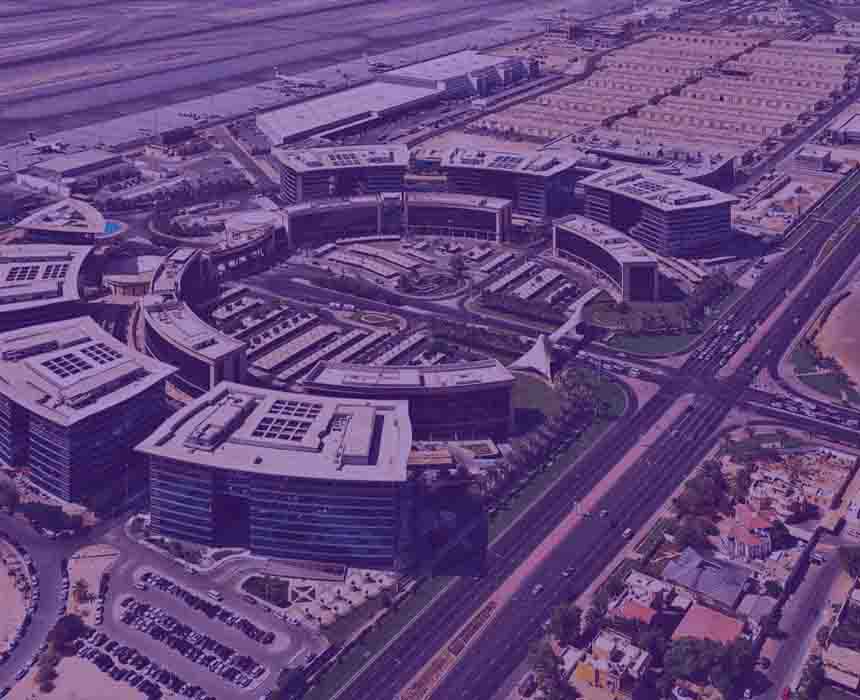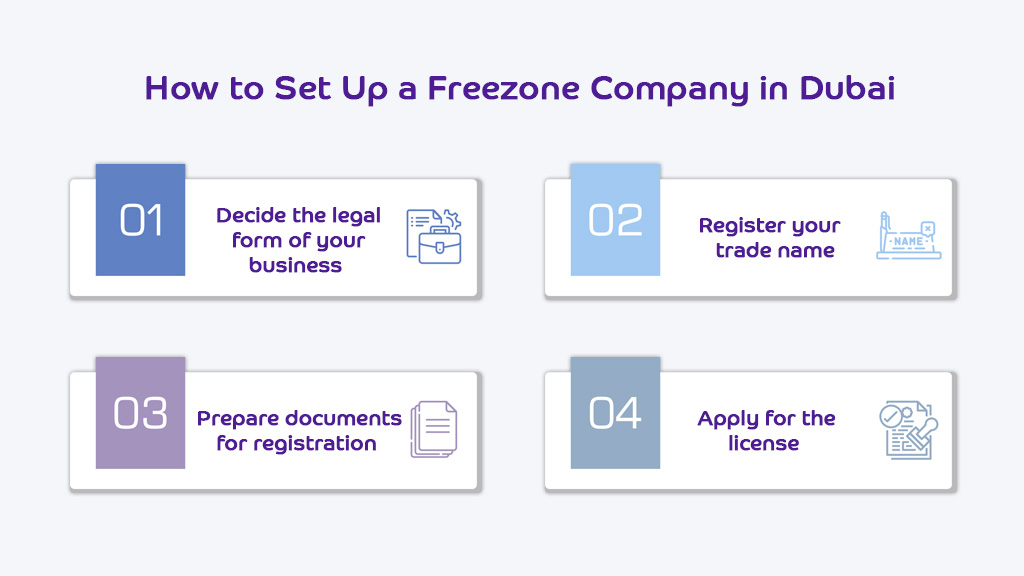
Dubai is the city of dreams. Over the past two decades or so, Dubai’s taken center stage in the world’s economy, attracting ambitious entrepreneurs from across the globe.
From a humble desert city to an energetic metropolitan hub, Dubai’s the abode for some of the highest number of expats in the world. This isn’t surprising as the city offers a superior quality of life, unsurpassed infrastructure, and plenty of cultural activities.
But when you think of setting up your company in Dubai, you will have many questions to answer and one of the most important questions is
‘Will you establish your business on the mainland or have a Freezone company?’
This blog will explain to you how to set up your business in a Freezone area and the difference between an onshore company vs. a Freezone company.
The UAE has top-notch infrastructure that facilitates business growth, enhances your quality of life, makes commuting easy, and offers accommodation of all types. In fact, according to the BCG Decoding Global Talent series, Dubai ranked sixth across the world for digital talent, and as the fourth-best relocation spot as per The Relocation Report by Money.co.uk.
But how will you decide whether you will have an onshore entity or a Freezone company in Dubai? Let’s look at the differences between setting up a business onshore vs. Freezone areas.
An onshore entity is created for business on the mainland, or in other terms, outside the free zone. This includes a partnership firm, a limited liability company (LLC), a limited partnership firm, a private joint stock company (PJSC), or a public joint stock company.
Whereas, a free zone entity is created within the allotted area and holds several advantages, one of which is the ease and simplicity of setup.
Let’s look at how the two differ from one another.
With a company set up in the Dubai free zone areas, entrepreneurs are exempt from certain activities from the levy of Corporate Tax. Onshore entities do not get tax exemption, but the tax rate at large is 0%.
In a free zone, companies can conduct 100% repatriation of profits, whereas some sectors are excluded from an onshore entity.
With a Dubai free zone license, you are exempt from all export or import duties, compared to 5% on most products onshore.
Companies with a free zone license can freely trade internationally and within the free zone. Within the UAE, they must do this through a distributor. Those with an onshore license can trade throughout the UAE and internationally.
Once you’re done with your new business setup in a free zone, you won’t have any limitations when hiring foreign employees. However, for an onshore entity, it would depend on your company’s size and what sector it is in.
Setting up a free zone company instantly makes you qualified for a Visa. However, with an onshore entity, you need to have a local sponsor who can apply for your visa on your behalf and renew it regularly.
For a Dubai-free zone, all the requirements depend on the free zone you’re in, whereas, for an onshore, it’s based on the location where you’re operating.
Related Article: How to Setup Business in Dubai
Thus, from the above discussion, it must be clear to you that setting up a free zone company is much more advantageous than having an onshore entity.
Let’s learn the steps to start your business in the free zone areas in Dubai.

Once you’ve made up your mind about starting a business in the Dubai free zone, you simply have to follow a list of steps. Each free zone might have different requirements, but the overarching process remains similar. Costs might differ depending on the type of free zone as well. So whether you’re on the lookout for Dubai free zone company setup cost or other forms of advice, this guide has all you need.
An important step to take before the company’s formation is to decipher the legal type of the company. It could be two types:
Zones that have the availability of LLC are limited. We suggest looking into the two types, and never shy away from asking your Dubai free zone point of contact for more details.
Once you have the legal type of company figured out, it’s now time to register your company’s name. In free zone terms, this is known as trade name registration. Before obtaining a Dubai free zone license, the respective authority needs to have approved the name that you proposed.
Here are some guidelines when choosing a name for your company:
Once you have registered your business name, you need to apply for the trade license without which you cannot conduct your business. Before applying for the license, you must keep your documents ready to avoid missing any important documents for the registration.
The next step of the Dubai free zone company formation involves applying for your license. This step needs to be taken after your company name has been approved. The business license application requirements could differ per free zone.
In general, it might be as follows:
Once your application is sent, the government will issue a valid trade license in the trade name you selected in the second step with its validity mentioned in the certificate.
However, there are many free zone areas in Dubai and in the entire UAE, you must consider the pros and cons of each free zone area and pick one that suits your business needs the most.
Dubai is home to more than 30 free zones. If you find yourself asking which is the cheapest free zone in Dubai for setting up a business, the answer truly varies. Each free zone has a set of rules, regulations, and costs. Before selecting your free zone, it’s important to research the types of companies already registered, perks for your type of business, and the documents you will need for setup. These are some of the main free zones in Dubai.
As a part of the TECOM Group, the Dubai Design District was built for creativity to flow. Offering several advantages for designers, companies ranging from fashion houses to agencies are registered here. It’s also the prime venue for art and culture festivals within the city.
One of the most revered free zones in Dubai, it’s home to thousands of registered companies and staff. The process of applying is fairly simple and you will also get the help you require at every turn.
If you’re looking to set up a medical or healthcare institution in Dubai, Dubai Healthcare City is the perfect free zone. Types of companies registered under this free zone include healthcare, medical equipment, wellness, pharmacies, medical product distribution, alternative healthcare such as Ayurveda, and medical education.
The starting point of some of the region’s largest media houses, Dubai Internet City’s reach spans thousands of companies and employees. Technology companies registered with this free zone are offered taxation, equity, and ownership perks. Companies also get a fair amount of autonomy and are in one of the most vibrant hubs of the city, next to the Dubai Marina.
Some of the biggest financial institutions in the world have found a place in Dubai International Financial Center. Centrally located, very close to the Dubai World Trade Center and Dubai’s iconic Sheikh Zayed Road, nearly 3000 companies have registered with this free zone.
You May Also Like To Read: Our 101 Guide for Starting Business in UAE
According to the Dubai Chamber of Commerce, the UAE’s expected GDP growth rate in 2022 is 3.4%. Moreover, Dubai’s economy will maintain steady growth owing to its non-oil-supported sectors such as retail and tourism. Sectors that will have a larger role to play include telecommunication, transport, trade, business services, and real estate. This makes now a better time than ever to set up a business in a Dubai-free zone.